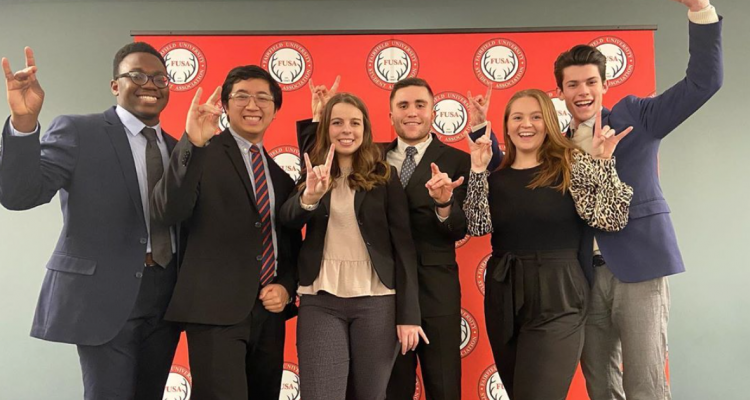The Fairfield University Student Association held the Presidential debate on Tuesday night, Feb. 18 at 6:30 p.m. in the Dogwoods Room of the John A. Barone Campus Center. The six nominees, running on three tickets, discussed sustainability, transparency, diversity and other matters concerning student life.
Juniors Sean Crosby and Angelica Miceli-Kaya delivered their opening statement with an emphasis on advocacy and transparency.
Transparency is perhaps the most distinctive aspect of this ticket, and it was one of their four main goals that they mentioned. The candidates were direct in their criticism of the current administration and the ways in which they would work to ameliorate the means of communication in their potential administration.
“Sean and I have noticed an extreme lack of communication between our current president and vice president. There seems to be an ‘I’ mentality that hindered others from voicing their opinions,” stated Miceli-Kaya.
Throughout the debate there were two responses from this ticket that further emphasized and specified their goal of transparency. The first was in regard to the controversial topic of secret ballots within FUSA. Crosby was adamantly against the practice of secret ballots within the senate, stating that senators, as well as the President and Vice President, are elected to make decisions, and it is important for transparency that the students know what their elected officials are voting for or against.
They also spoke about the use of social media to connect with the student body on a more personal level, as well as the possibility of having set times where students could come and sit with the President and Vice President to get to know them better and express any concerns that they may have.
Sustainability was an aspect that was included in every ticket’s campaign, as it is an issue which many students are concerned and passionate about.
Sophomores Vincent Gadioma and Tobenna Ugwu push sustainability as one of their biggest concerns. One of the questions stated that Fairfield recycles only 9% of their waste and asked candidates for specific ways in which they plan to make the university’s recycling efforts better.
Gadioma presented his idea that there be color-coded bins that designate which materials go where, such a paper, plastic, glass and metal. This would make recycling on-campus more convenient for students, and hopefully make the process of the actual picking up and recycling of the waste from the university more efficient as well.
Additionally, Ugwu and Gadioma emphasized the impact they believed could be made on campus by students who were passionate and had the means and the structure to take real action towards a greener campus.
“Efforts to create a student led task force for sustainability has been pushed aside to the senate,” said Gadioma.
He then went on to state his belief that if he and Ugwu were to be elected into office they could achieve the creation of such a task force.
A unique issue that was brought up, and specifically addressed by Noelle Guerrera ‘21 and Ali Haidar ‘21, was food insecurity on campus. Guerrera explained that this was an issue of students not knowing where their next meal would come from, or when.
Guerrera presented her idea of a meal swipe program, which would allow students with extra meal swipes to donate them to other students in need. Those students could privately identify themselves as food insecure and the donated swipes would be transferred onto their StagCard so that they could have full access to the Daniel and Grace Tully Dining Commons and find a full and healthy meal.
Haidar added to this proposal by promoting the improvement of the quality of food at the Tully and the Stag as well as accessibility to both food options. Students would be more willing to get food on campus if the food was more diverse and attuned to allergies and religious or personal restrictions, he said.
The issue of diversity on campus was one to which each ticket had a specific and elaborate response. The moderators stated that Fairfield University is the least ethnically diverse university in the state of Connecticut.
Ugwu spoke of his involvement with the Student Diversity and Multicultural Affairs office on campus, along with his work on FUSA’s Diversity and Inclusion Board. He is involved with research on how to increase the number of diverse students on campus and how to ensure that they are all “treated equally and given all the same opportunities.”
Both Ugwu and Haidar expanded the issue of diversity beyond race to include the status of commuter students on campus. Haidar brought up his hopes to find the commuters a larger lounge area that is more central and would allow those students to feel connected to the rest of the campus and student body.
Haidar also expanded the issue of diversity to religion as well, promoting “religious plurality” on campus. Miceli-Kaya reemphasized the need to improve diversity on campus in all of those same areas, but she also brought up the issue of gender and financial situations dividing students, as well as her hopes to remove the stigmas and divisions that can come with those groupings.
Throughout the entire debate, each ticket was insistent on both their passion for making a positive difference on this campus and advocating for students and the issues that they feel need to be addressed in this community.
The ballot will open on Life@Fairfield on Thursday Feb. 20 at 8 p.m. and will close on Tuesday Feb. 25 at 5 p.m., which will be followed by an election party at the Levee where the results will be announced. Make sure to make your voice heard in this campus government election!
Editor’s Note: Tobenna Ugwu is the current Coffee Break Editor of The Mirror.


Leave a Reply